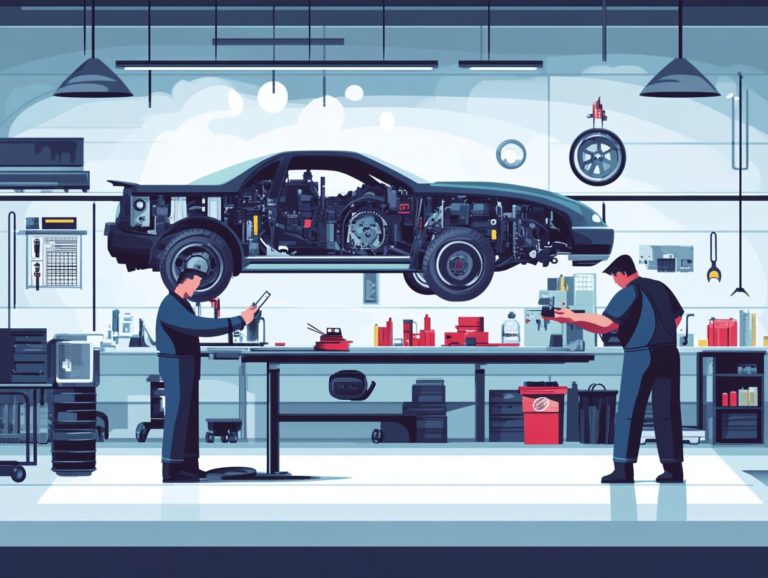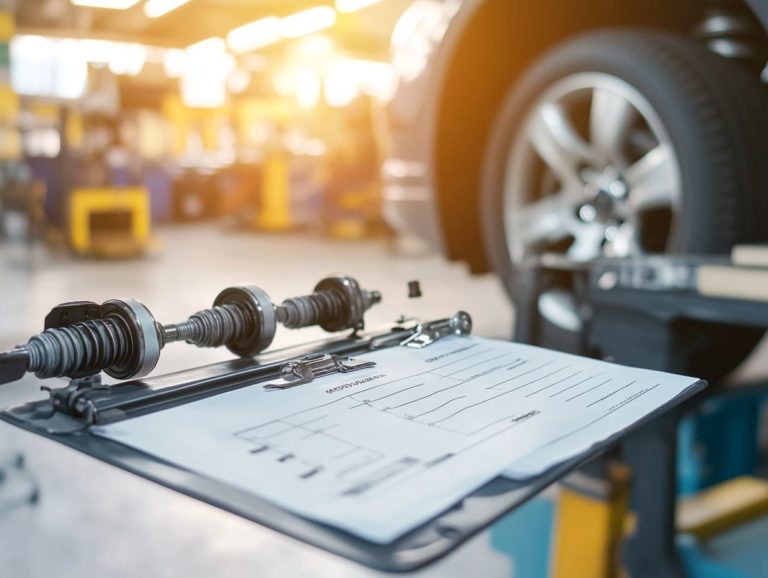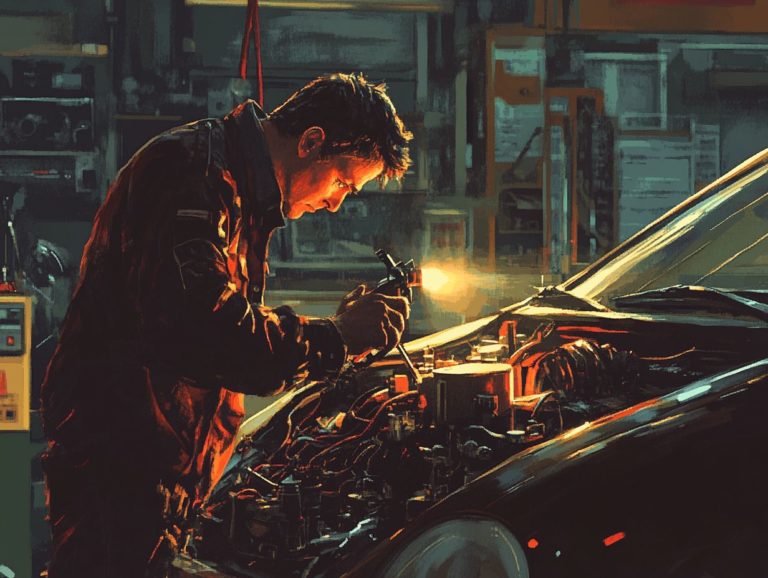The Best Time of Year for a Car Inspection
Maintaining your car in peak condition involves more than just routine oil changes and tire rotations. It begins with consistent inspections.
Regular vehicle checks are crucial. Factors like weather conditions and your driving habits shape how often you should inspect your car.
Explore industry recommendations on inspection frequency. Understanding specific maintenance requirements for each season can help streamline the process.
By prioritizing regular inspections, you ensure your vehicle’s safety and longevity.
Contents
- Key Takeaways:
- The Importance of Regular Car Inspections
- Factors to Consider for Timing of Inspections
- Recommended Frequency of Inspections
- Seasonal Considerations for Car Inspections
- How to Prepare for a Car Inspection
- Frequently Asked Questions
- When is the best time of year for a car inspection?
- Why is spring or fall the best time for a car inspection?
- Can I have my car inspected at any time of year?
- What are the benefits of getting a car inspection at the right time of year?
- What can I expect during a car inspection at the right time of year?
- Is it necessary to have a car inspection if my car seems to be running fine?
Key Takeaways:
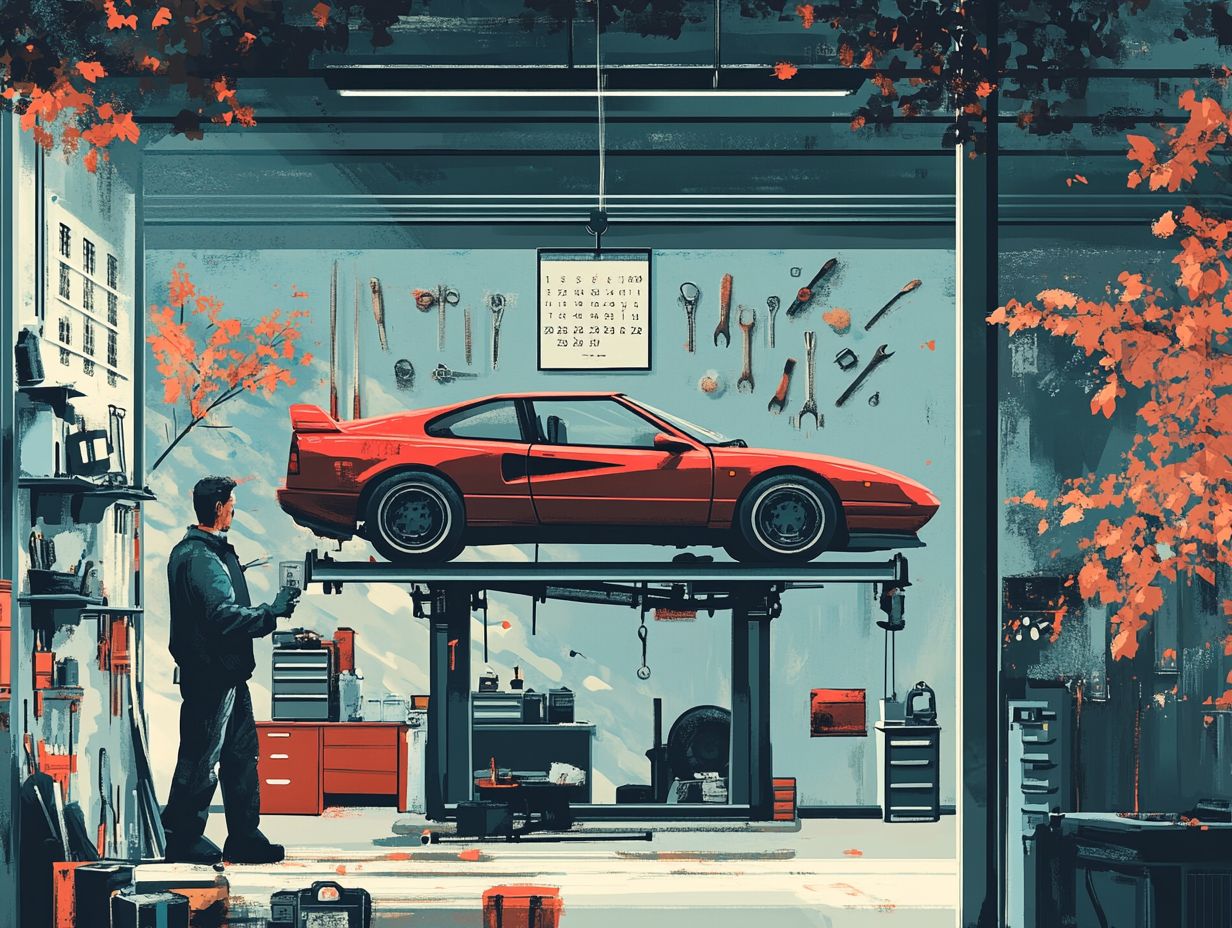
Regular car inspections are crucial for vehicle safety and maintenance. Consider factors such as weather, driving habits, and mileage when determining the best time for inspections.
Follow industry standards for recommended inspection frequency. Seasonal inspections can help address specific maintenance needs.
The Importance of Regular Car Inspections
Regular car inspections in North Carolina are essential for ensuring your vehicle s safety. They help meet state regulations and maintain overall performance.
These inspections help identify potential issues before they escalate into major problems. They also play a significant role in reducing emissions that contribute to environmental pollution.
In NC, adhering to vehicle inspection requirements set by the NCDOT is necessary. Ignoring these regulations could lead to penalties, like expired tags or complications with registration.
Establishing a routine for car maintenance and inspections can save you time and money. It enhances road safety for yourself and others.
Why You Should Get Your Car Inspected
Getting your car inspected is vital for your safety and compliance with North Carolina regulations. Regular inspections help prevent accidents by catching potential issues early.
This approach boosts your vehicle’s overall performance and extends the life of its components. Meeting emissions standards is essential for protecting the environment, ensuring your vehicle isn t releasing harmful pollutants.
Inspections encourage important maintenance checks like brake assessments and tire evaluations. Staying informed about your vehicle s condition empowers you as a driver.
A well-maintained vehicle gives you peace of mind. You’re upholding both safety and environmental responsibilities.
Factors to Consider for Timing of Inspections
When planning your vehicle inspections in North Carolina, several key factors come into play. Weather conditions, road conditions, and your own driving habits are vital considerations.
Each of these elements can significantly affect your car’s performance and safety. For example, extreme weather can accelerate wear and tear.
Driving habits, like taking frequent short trips, may require more regular checks. By understanding these factors, you can proactively schedule your inspections.
Weather and Road Conditions
Weather and road conditions are pivotal for the necessity and timing of vehicle inspections. Severe weather events like heavy rain, ice storms, and hurricanes can dramatically impact performance and safety.
For example, after a sudden downpour, roads can become slick, increasing the risk of losing traction. Freezing temperatures may also lead to battery failures or brake malfunctions without proper maintenance.
In such conditions, regular inspections become essential. They help identify and address potential issues before they escalate into hazardous situations.
By ensuring your vehicle is equipped to handle adverse weather, you significantly reduce the risk of accidents. This fosters safer journeys for everyone on the road.
Don’t wait for problems to arise! Schedule your car inspection today to ensure safe travels!
Driving Habits and Mileage

Your driving habits and the mileage on your vehicle play a crucial role in determining when to schedule inspections.
Consider this: frequent stop-and-go traffic can accelerate wear on important parts like brakes and the transmission. This may require you to arrange for check-ups more regularly.
On the flip side, highway driving keeps the engine temperature steady and allows for consistent speeds, resulting in less strain on vital parts.
It s wise to factor in these driving patterns along with your mileage. If you often navigate urban environments with heavy traffic, schedule inspections every 3,000 to 5,000 miles. This proactive approach helps maintain safety and performance while extending the life of your vehicle.
Recommended Frequency of Inspections
In North Carolina, the recommended frequency for vehicle inspections is shaped by industry standards and state guidelines. Most vehicles typically require annual inspections.
Following these recommendations keeps you compliant with DMV regulations and your vehicle safe!
Familiarizing yourself with these standards allows you to plan your vehicle maintenance effectively, ensuring your car remains roadworthy all year round.
Industry Standards and Guidelines
Industry standards and guidelines for vehicle inspections in North Carolina provide a crucial framework for safety and compliance. These regulations outline clear protocols that you, as a vehicle owner, must follow. Regular checks of essential parts like brakes, lights, and emissions systems are necessary.
By adhering to these standards, you extend your vehicle’s longevity and enhance road safety for everyone. North Carolina mandates inspections at specific intervals to minimize the risk of accidents from mechanical failures.
Understanding these regulations gives you the power to recognize the significance of proactive maintenance. Stay informed about your vehicle’s condition. This knowledge ensures your peace of mind on the road.
Seasonal Considerations for Car Inspections
Seasonal considerations for car inspections in North Carolina are crucial. Varying weather conditions can significantly affect your vehicle’s performance and safety throughout the year.
Each season brings its own challenges, requiring specific maintenance tasks and inspections to keep your vehicle in peak condition.
Understanding these seasonal factors helps you schedule inspections proactively, enhancing your driving safety and ensuring a smoother journey.
Benefits of Seasonal Inspections
Seasonal inspections offer many advantages for your vehicle’s safety and maintenance in North Carolina. These regular checks help pinpoint potential issues before they turn into costly repairs, significantly bolstering road safety.
They also reduce the chances of unexpected breakdowns, which can be both inconvenient and dangerous. Keeping your vehicle in prime condition promotes longevity, ensuring it remains a reliable companion for years to come.
Ultimately, embracing seasonal inspections grants you peace of mind and cultivates a smart way to take care of your car, helping you stay ahead of any mechanical troubles that may arise.
Specific Seasonal Maintenance Needs

Different seasons bring unique maintenance needs for your vehicle in North Carolina, ensuring optimal performance and safety.
In winter, prioritize tire checks to ensure you have adequate traction on icy roads. Don’t forget to inspect your battery’s health, as unexpected failures can occur in frigid temperatures.
When spring rolls around, conduct thorough inspections of your wiper blades and fluid levels, especially coolant, to prepare for the impending rain and warmer weather.
As summer approaches, keep an eye on your air conditioning performance and top off engine fluids to combat the heat.
With fall’s arrival, assessing your braking system is vital, as increased rainfall can impact your stopping distance. By following these seasonal maintenance checks, you enhance your vehicle’s longevity and reliability.
How to Prepare for a Car Inspection
Preparing for a car inspection in North Carolina requires careful planning and attention to detail. This sets the stage for a smooth process and a successful outcome.
By understanding what to expect during the inspection and taking the necessary steps beforehand, you can proactively address potential issues, boosting your chances of passing.
This foresight saves you time and money while ensuring your vehicle is both roadworthy and compliant with state regulations.
Tips for Ensuring a Smooth Inspection
Implementing a few simple tips can help ensure a smooth vehicle inspection process in North Carolina. By taking time to prepare, you can enhance your chances of passing and identify potential issues before they arise.
Start by giving your car a thorough cleaning. A tidy vehicle not only looks impressive but also allows for easier access to important components.
Next, check the fluid levels oil, coolant, and brake fluid to guarantee optimal performance. Address any warning lights on the dashboard, such as engine alerts, to avoid surprises during the inspection.
Local technicians recommend bringing your vehicle in for a pre-inspection checkup. This allows them to catch minor issues that could lead to a failed inspection.
The Importance of Regular Inspections for Vehicle Safety
Regular inspections are essential for ensuring your vehicle’s safety and reliability in North Carolina. These routine checks help you comply with state regulations and identify potential safety hazards before they develop into serious problems.
Research from the National Highway Traffic Safety Administration shows that vehicles undergoing regular inspections can reduce the risk of accidents due to mechanical failures by 30%. Many cases demonstrate how inspections can uncover issues like brake deficiencies or tire wear that the average driver might overlook.
Taking these proactive steps can save lives and reduce your repair bills over time. Prioritizing regular inspections highlights the critical need for vigilance in maintaining your vehicle.
Frequently Asked Questions
When is the best time of year for a car inspection?
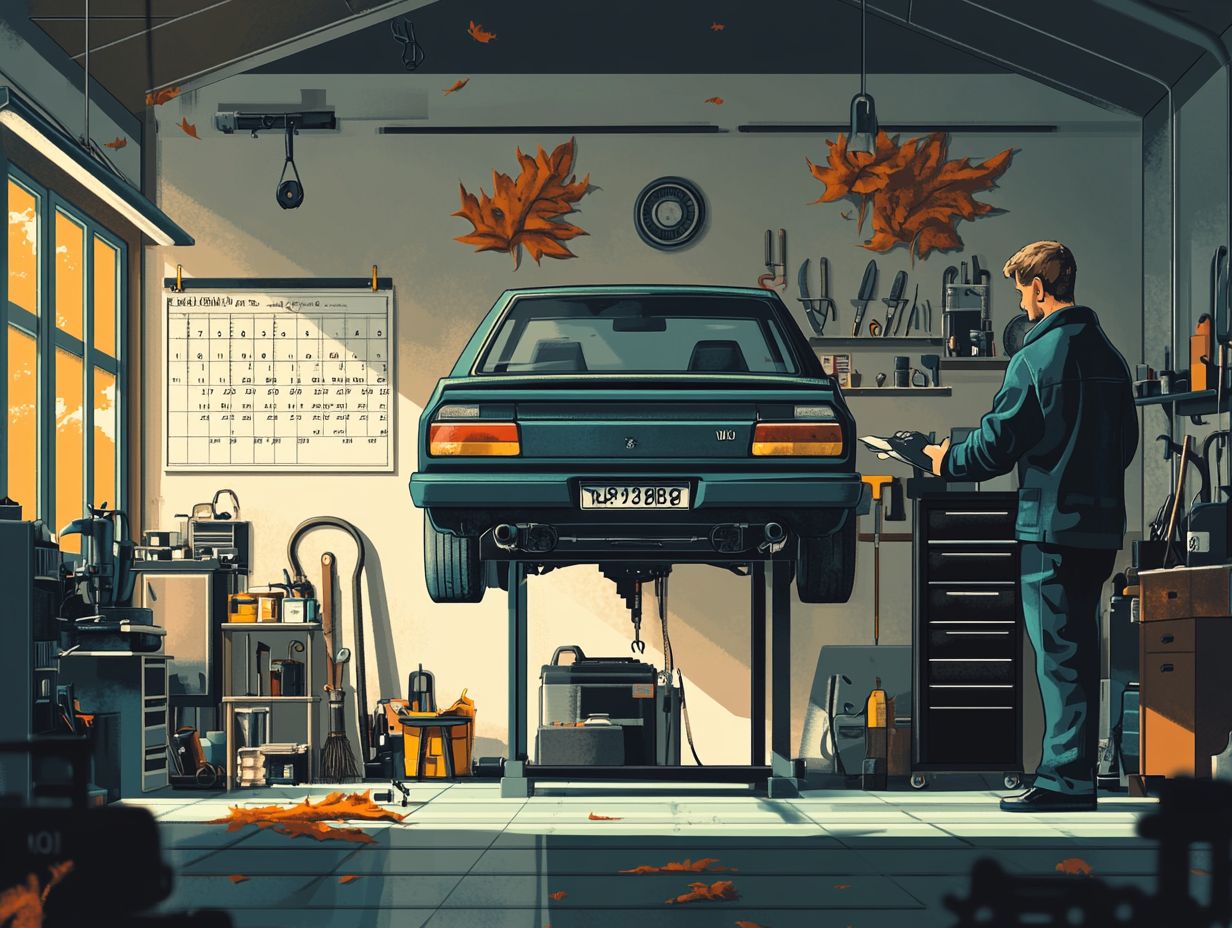
The best time of year for a car inspection is typically in the spring or fall. This allows for any necessary repairs to be made before the extreme temperatures of summer or winter. Additionally, knowing the best time of year to buy a new car can also help you plan your vehicle maintenance effectively.
Why is spring or fall the best time for a car inspection?
Spring and fall are optimal times for a car inspection because they generally have more moderate temperatures, making it easier to detect any issues with the vehicle. Additionally, understanding the best time of year to negotiate car prices can further enhance your buying experience and help prevent potential breakdowns during the extreme conditions of summer or winter.
Can I have my car inspected at any time of year?
Yes, you can have your car inspected at any time of year. However, it is advisable to schedule it in the spring or fall for the best results.
What are the benefits of getting a car inspection at the right time of year?
Getting a car inspection during the best time of year can help you avoid breakdowns during extreme temperatures, save money on repairs by catching issues early, and ensure your car is running efficiently and safely.
What can I expect during a car inspection at the right time of year?
During an inspection, a trained mechanic will check your vehicle’s overall condition, including the engine, brakes, tires, and other essential components. They will also look for any potential safety hazards and advise you on necessary repairs.
Is it necessary to have a car inspection if my car seems to be running fine?
Yes, it remains necessary to have a car inspection even if your vehicle appears to be functioning well. Many issues can go unnoticed until they escalate into major problems, and regular inspections can help prevent this. Additionally, catching potential issues early can save you money in the long run.
Don’t wait schedule your inspection today to keep your vehicle safe and sound!

